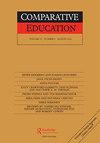The Politics of Higher Education: The Imperial University in Northern Song China
IF 3.7
1区 教育学
Q1 EDUCATION & EDUCATIONAL RESEARCH
引用次数: 0
Abstract
education’ should not limit itself to a series of actual historical accounts unless they can be shown to be exemplars of ways of investigating. In this regard both the Oxford and the Springer handbooks are only partially successful, since there are many (though very good) historical accounts that are not obviously exemplary in terms of ways of doing history. Both handbooks bring together an impressive group of scholars: their individual contributions will for the most part be of lasting value to readers wanting an authoritative overview of a particular topic. Only one contribution is written in impenetrable style. One writer thinks Magritte’s first name was ‘Renee’. As is the case with many compendia, it would have been helpful to contrive cross-referencing throughout, to enable greater coherence within and between sections. The indexes too could have been more useful as tools to navigate the complexity of coverage in both publications. They are far too selective: search in vain, for example, for Brian Simon or Lawrence Stone or Lawrence E. Cremin in the index of the Springer Handbook or Friedrich Paulsen in both. The on-line versions will of course be more searchable, but readers using the print versions will have to do a lot of textual excavation to uncover mention of people and places mentioned in the endnotes. Taken together, the two handbooks will be of lasting value to historians of education who will turn to their rich coverage of the field for insights into a huge range of issues of importance to anyone engaged in serious historical inquiry.高等教育的政治:北宋时期的帝国大学
教育不应该把自己局限于一系列真实的历史记录,除非它们能被证明是研究方法的范例。在这方面,牛津和斯普林格的手册都只是部分成功,因为有许多(尽管非常好)历史记载在研究历史的方式方面并不是明显的典范。这两本手册汇集了一群令人印象深刻的学者:他们的个人贡献将在很大程度上对想要对特定主题进行权威概述的读者具有持久的价值。只有一篇文章是用难以理解的风格写的。一位作家认为马格利特的名字是“蕾妮”。与许多概要的情况一样,在整个过程中进行交叉参考将会有所帮助,从而使各节内部和各节之间更加连贯。作为一种工具,这些索引本来也可以更有用,以便在这两份出版物的复杂报道中进行导航。他们过于挑剔:例如,在《施普林格手册》的索引中搜索布莱恩·西蒙、劳伦斯·斯通或劳伦斯·e·克雷明,或者在两者的索引中搜索弗里德里希·鲍尔森,都是徒劳的。在线版本当然更容易搜索,但使用印刷版的读者将不得不做大量的文本挖掘,以发现尾注中提到的人和地点。合在一起,这两本手册将对教育历史学家具有持久的价值,他们将利用它们对该领域的丰富覆盖来深入了解对任何从事严肃历史调查的人都很重要的一系列问题。
本文章由计算机程序翻译,如有差异,请以英文原文为准。
求助全文
约1分钟内获得全文
求助全文
来源期刊

Comparative Education
EDUCATION & EDUCATIONAL RESEARCH-
CiteScore
7.40
自引率
21.20%
发文量
35
期刊介绍:
This international journal of educational studies presents up-to-date information with analyses of significant problems and trends throughout the world. Comparative Education engages with challenging theoretical and methodological issues - and also considers the implications of comparative studies for the formation and implementation of policies - not only in education but in social, national and international development. Thus it welcomes contributions from associated disciplines in the fields of government, management, sociology - and indeed technology and communications - as these affect educational research and policy decisions.
 求助内容:
求助内容: 应助结果提醒方式:
应助结果提醒方式:


